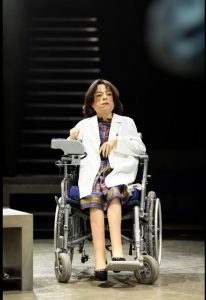Larry Kramer’s blistering attack on prejudice and complacency in the early days of AIDS epidemic
★★★★

The Normal Heart, written in 1985 as the AIDS epidemic was finally beginning to be acknowledged, is based on author Larry Kramer’s own experience of this period. It’s a play that highlights prejudice and ignorance, fighting for what is right, and what it’s like to live in a time of plague.
The lead character Ned is semi-autobiographical and it’s great to see Ben Daniels given the starring role. He’s an excellent actor who always delivers on stage or screen. These days is probably best known for playing Princess Margaret’s husband in The Crown but in this production, directed by Dominic Cooke, he shows how he can carry a whole show.
This production was stopped in its tracks by the COVID -19 pandemic. So, inevitably, now that it’s finally made it onto the Olivier stage, we view it in the light of our experience of what’s happened over the last year and a half. We recognise the authorities’ slowness to respond to what was going on, albeit nothing like the fatal head-in-the-sand attitude to the early deaths within New York’s gay community. In the unwillingness of people to do what’s necessary to save lives, we can see a parallel with some gay men back then refusing to modify their sex lives. We are also familiar with wide-ranging and sometimes wild theories about causes and cures that have since gone by the wayside. In the play, you get the sense of bewilderment and panic about where this so-called ‘gay plague’ has come from and how it’s being spread.
What’s also happened between the postponement of this production and now is the joyous but devastating TV series It’s A Sin by Russell T Davies. That was set in the UK rather than New York and took us into the 90s but anyone who has seen it will recognise the way some newly liberated gay men became highly promiscuous during the 70s and 80s, and again the slowness to react, and the crushing sadness of friends dying all around, and the reconciliation between some parents, especially mothers, and their dying sons.
The Normal Heart is much more overtly political than It’s A Sin. It might be better compared with Albert Camus‘ The Plague, in which an outbreak of bubonic plague follows a similar trajectory and is intended as an analogy for the rise of Nazism.
The Normal Heart follows closely the developments in early 1980s New York: the early deaths, the uncertainties, one doctor flagging up the concern, and the forming of an organisation intended to warn gay men of the danger, help those that contracted AIDs, and pursue the authorities for support.
It’s hard to know what’s more depressing: people faced with the possibility of contracting a fatal disease still carrying on with a reckless lifestyle, or the authorities and media trying to pretend it wasn’t happening because this seemed to be only to do with gay men, and not something they wanted to be associated with. So both familiar and yet still shocking.
Ned is instantly at odds with his fellow campaigners. He is all for directness and shouting from the rooftops in order to pressurise those in power into action, and his fellow gay men to refrain from sex. I guess he’s the kind of person who these days would be gluing himself to the motorway. Others, some still in the closet, argue for a more softly softly approach.
Humour, pain, anger and compassion
Because the abrasive Ned is never afraid to tell it like it is, he has some barnstorming moments, but the other actors in Ned’s circle including Luke Norris, Dino Fetscher, Daniel Monks and Danny Lee Wynter, take hold of their well drawn, varied characters and fill this evening with humour, pain, anger and compassion.

Liz Carr plays Doctor Brookner who first notices the increase in this distinctive illness and goes from compassionate but objective medic to militant campaigner, with a blistering speech in the second act. ‘How does it always happen that all of the idiots are always on your team?’ she asks her opponents.
Ned is also in conflict with his straight brother Ben, given a nicely nuanced performance by Robert Bowman, who shows the love he feels for his brother while barely able to disguise his homophobia.
Not only does Kramer give the various members of the group the space to express their differing feelings and opinions, he digs deep into his main protagonist’s character. Despite all the risks of intimacy, the previously lonely Ned falls in love and suddenly the story of this epidemic becomes very personal. Love is what makes Ned a human ding rather than a simple polemicist
The end is heartbreaking, compounded by the misery of the latter stages of the disease and, even after their death, the continuing prejudice in the treatment of their bodies. If you are not in tears by the end, I would question whether you have a heart.
Although the setting is specifically the gay community of New York in the early 80s, the behaviour it shows can be seen again and again in many other situations. We’re reminded by Ned in the play how governments turned a blind eye to the Nazis’ treatment of Jews. And if we look around today, we could take the example of the way a male-dominated, misogynistic judicial system consistently fails to take effective action against the number of rapes and other violence against women. Or the way elderly people in care homes were treated during the COVID -19 outbreak (see Help by Jack Thorne on All4). Or the daily discrimination against black people (see my review of Typical).
A word about the set. The Olivier at the National Theatre has been converted into a theatre-in-the round. The stage is a circle with a thin light all the way round the circumference, perhaps suggesting the way gay men were seen at that time as separate from the rest of society. It’s pretty much bare apart from a few benches so this production is all about the acting, and that to be frank is a relief after many productions I’ve seen in this large space where the set design has dwarfed the play. The set, designed by Vicki Mortimer, also has a flame burning high up throughout. I took this to represent the kind of eternal flame you find at a tomb of the unknown soldier, as if to say these thousands who died through the prejudice and ignorance should not be forgotten.
To make this truly in-the-round, there are seats on what would normally be the stage, though it was my impression, sitting in the circle that the actors faced to the traditional front the majority of the time. A word of warning: there are lighting towers positioned around edge of the circular stage. These will inevitably give you a restricted view if you sit in the right or left stalls and circle. I know this to be true because a delayed train caused me to arrive at the last moment, so I was sitting to the side for the first act before I was able to take my central seat.
The Normal Heart is a deeply moving play, with scintillating, witty, powerful dialogue that deserves this well acted revival.
Revision made on 1 October 2021 to add more about the significance of love and the universality of the message
The Normal Heart is performing at the National Theatre until 6 November 2021.
Click to watch this review on the YouTube channel One Minute Theatre Reviews